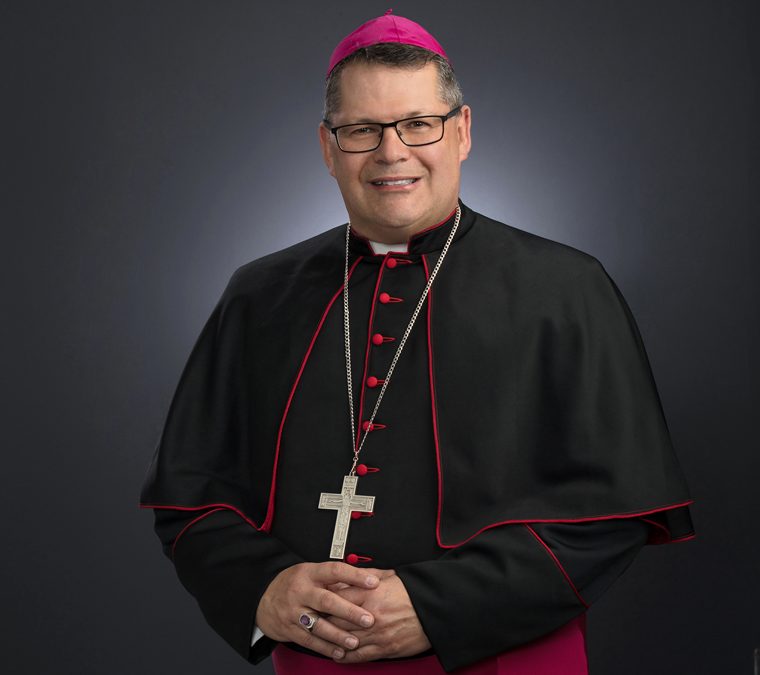This week, on Thursday or Sunday — dependent on where one is in the world — the Western Church will celebrate the Ascension of the Lord into heaven some 40 days after the Easter event of Jesus’ resurrection. On this occasion, the Risen Lord Jesus takes his place at the Father’s right hand and with the Father promises to pour forth the Holy Spirit upon his disciples. Therefore, one hears the great commission found in the Synoptic Gospels (Matthew, Mark, and Luke): “But they went forth and preached everywhere, while the Lord worked with them and confirmed the word through accompanying signs” (cf. Mk 16:20).
As I reflect on the Lord working with these early disciples in the spread of the Gospel through the outpouring of the Holy Spirit and in the food He gave them for the journey — the Eucharist — His very (and real) presence under the form of bread and wine, I recall the words of St. Cyril of Jerusalem in the Jerusalem Catecheses:
“Therefore, it is with complete assurance that we receive the bread and wine as the body and blood of Christ. His body is given to us under the symbol of bread, and his blood is given to us under the symbol of wine, in order to make us by receiving them one body and blood with him. Having his body and blood in our members, we become bearers of Christ and sharers, as St. Peter says, in the divine nature… Do not, then, regard the eucharistic elements as ordinary bread and wine: they are in fact the body and blood of the Lord, as he himself has declared. Whatever your senses may tell you, be strong in faith” (Office of Readings, Easter Saturday).
St. Cyril goes on to write:
“May purity of conscience remove the veil from the face of your soul so that by contemplating the glory of the Lord, as in a mirror, you may be transformed from glory to glory in Christ Jesus our Lord. To him be glory forever and ever. Amen” (Office of Readings, Easter Saturday).
The saintly bishop of Jerusalem teaches that our reception of the Holy Eucharist is all about transformation and about the strengthening of faith in our lives, so that the Risen Christ may be encountered through you and me! This is the commission you and I share in each time we receive our Lord in Holy Communion.
In other words, after this encounter our lives have a duty to be more Christ-like “as in a mirror.” This is what is spoken of in the Catechism of the Catholic Church as, “the fruits of Holy Communion” – Nos. 1391 to 1401. It is analogous to our belief in “the fruits of the Holy Spirit” which come from “the Gifts of the Holy Spirit” (cf. Gal 5:22-23). Some of the fruits of Holy Communion are: (1) augments our union with Christ; (2) nourishes the Christian life; (3) separates us from sin; (4) strengthens our charity; (5) preserves us from future mortal sins; (6) renews, strengthens, and deepens our incorporation as Church; (7) commits us to the poor; and (8) fosters our prayer for the unity of all Christians and an end to divisions. Above all, Nos. 1402 to 1405 in the Catechism teach that the Eucharist is, “Pledge of the Glory to Come.”
When all is said and done, the action of the Eucharist is “God sanctifying the world in Christ” (No. 1325) and our call “to put on the mind of Christ” as proclaimed by St. Paul in his various letters.
Upon this teaching rests the Catholic Church’s approach to the reception of Holy Communion by her faithful. It has nothing to do with one’s politics, as some may suggest today, but everything to do with a person’s effective living out of the Catholic faith. The Catechism of the Catholic Church exhorts: “The fidelity of the baptized is the primordial condition for the proclamation of the Gospel and for the Church’s mission in the world. In order that the message of salvation can show the power of its truth and radiance before men, it must be authenticated by the witness of the life of Christians” (No. 2044).
Our faithfulness to Christ and His Church is manifested by our conformity to his teaching as handed down by the Magisterium of the Pastors of the Church (cf. No. 2033). This “Deposit of Faith” is none other than the expression of the Law of God as found in the Word of God (i.e., Sacred Scripture) and in the teachings of Christ and the Church he founded (i.e., “The Word Made Flesh”). Like any deposit, “Faith” is meant to be guarded, invested, and spent as indicated in the Parable of the Talents (cf. Mt 25:14-30). It is not our private property and such attempts to privatize and remove “Faith” from the public square is central to the debate regarding Holy Communion in the present moment.
Holy Communion is not just about “me and God.” It is about my membership in the mystical Body of Christ born in the waters of baptism and the fostering of God’s life and holiness in me. As we read in 1 Peter 1:15-16: “[B]ut, as he who called you is holy, be holy yourselves in every aspect of your conduct, for it is written, “Be holy because I [am] holy.”
It is our conduct and its repercussions that we must consider as we prepare to receive our Lord in the Holy Eucharist. Are we conscious of actions in our lives that are contrary to God’s law and the teachings of the one, holy, catholic, and apostolic Church? From its early beginnings, it has been the criterion of the Catholic Church that, “No one may share the Eucharist with us unless he believes what we teach is true; unless he is washed in the regenerating waters of baptism for the remission of his sins, and unless he lives in accordance with the principles given us by Christ” (St. Justin, Apologist & Martyr).
Moreover, for the eucharistic encounter to bear the fruit God desires for our souls, the communicant must be free from grave or mortal sin. Since mortal sin — which is defined as the breaking of God’s commandments — is a rupture of our relationship with God, that relationship must be repaired with firmness of amendment and the Sacrament of Penance. Canon 916 states: “Anyone who is conscious of grave sin may not celebrate Mass {Note: Referring to clergy} or receive the Body of the Lord without previously having been to sacramental confession, unless there is a grave reason and there is no opportunity to confess; in this case the person is to remember the obligation to make an act of perfect contrition, which includes the resolve to go to confession as soon as possible.”
The Sacrament of Penance and the Sacrament of the Holy Eucharist are all about getting rid of “the veil” so that the face of God can be seen ever more clearly in our world today! How are you and I helping to fulfill this commission? It is time for us to remember again the most important citizenship we have: our heavenly one (cf. Phil 3:20)! Is all we are doing for the glory of God or have we allowed personal glory, comfort, and ambition to distract us? Brothers and sisters, may you and I be strong in faith as we celebrate the Risen Lord’s ascension into heaven and prepare to celebrate the birthday of the Church on the coming feast of Pentecost.







